Module 4 Seeing the doctor Unit 3 Language in use 课件(45张PPT)
文档属性
| 名称 | Module 4 Seeing the doctor Unit 3 Language in use 课件(45张PPT) |
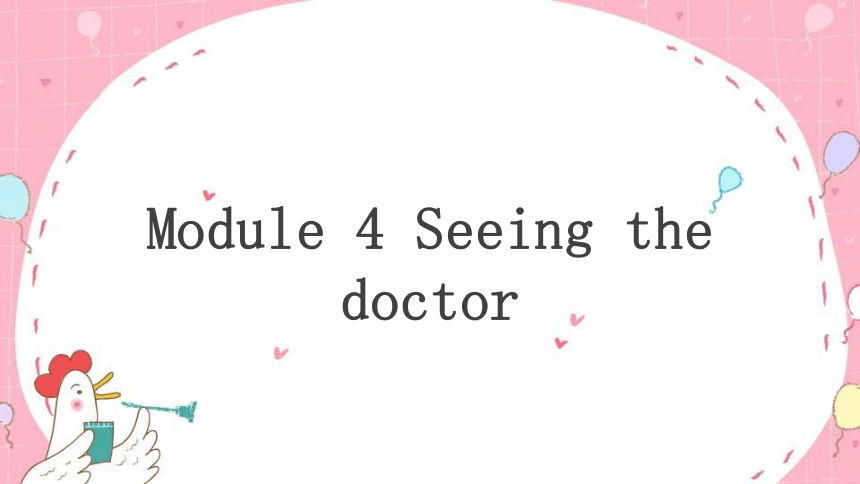
|
|
| 格式 | pptx | ||
| 文件大小 | 1.6MB | ||
| 资源类型 | 教案 | ||
| 版本资源 | 外研版 | ||
| 科目 | 英语 | ||
| 更新时间 | 2022-05-08 10:17:21 | ||
图片预览


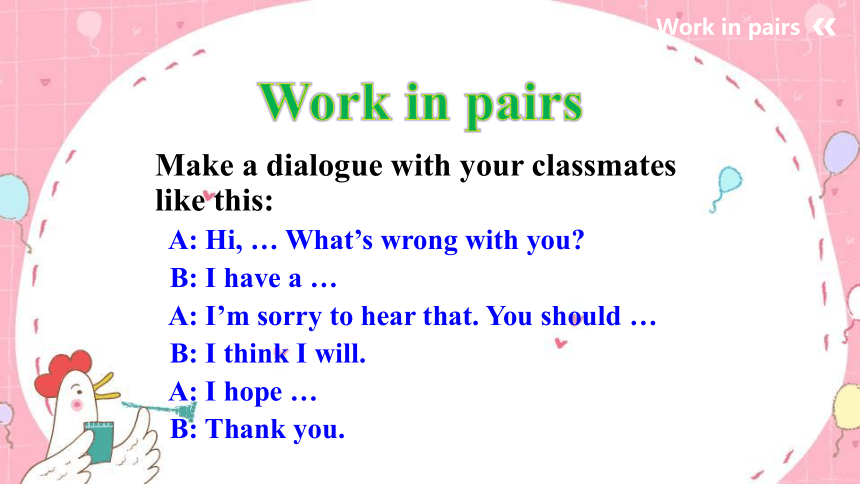
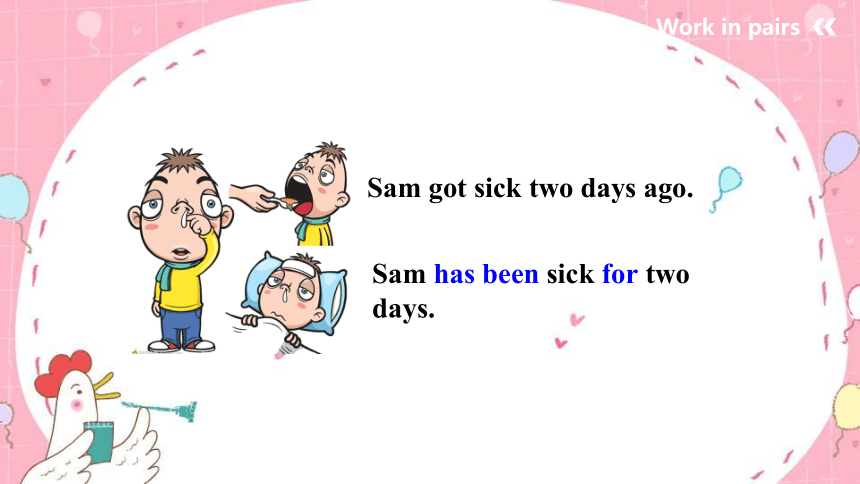
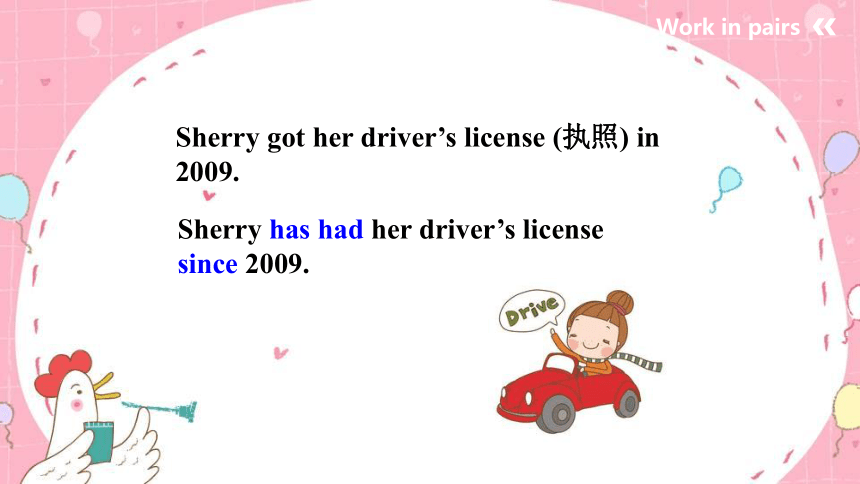
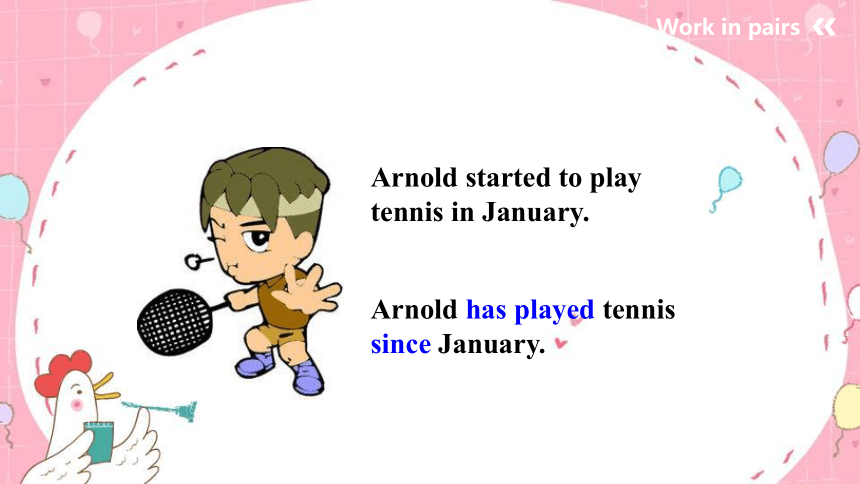
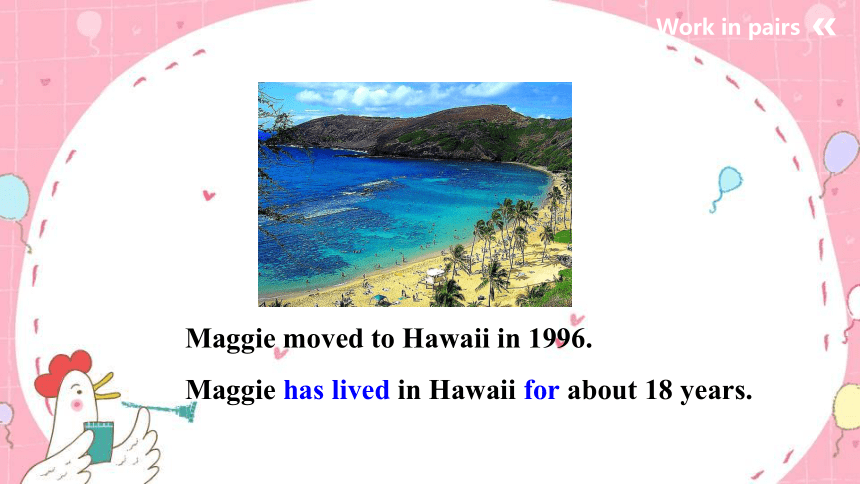
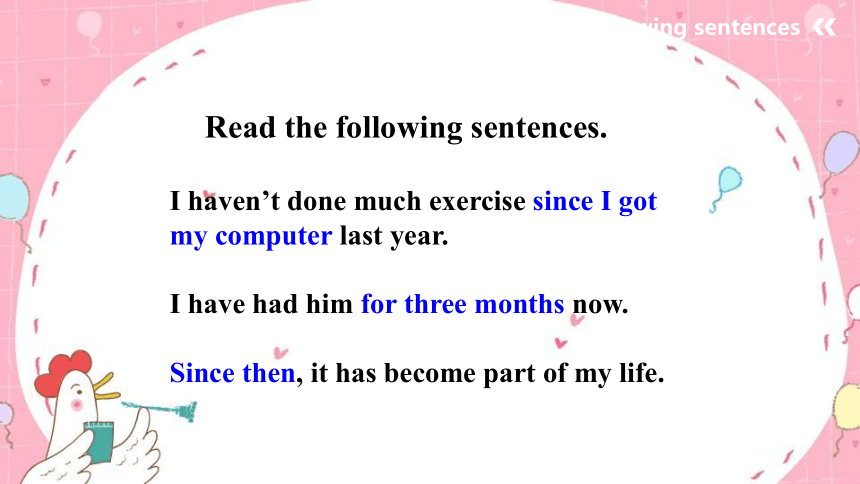
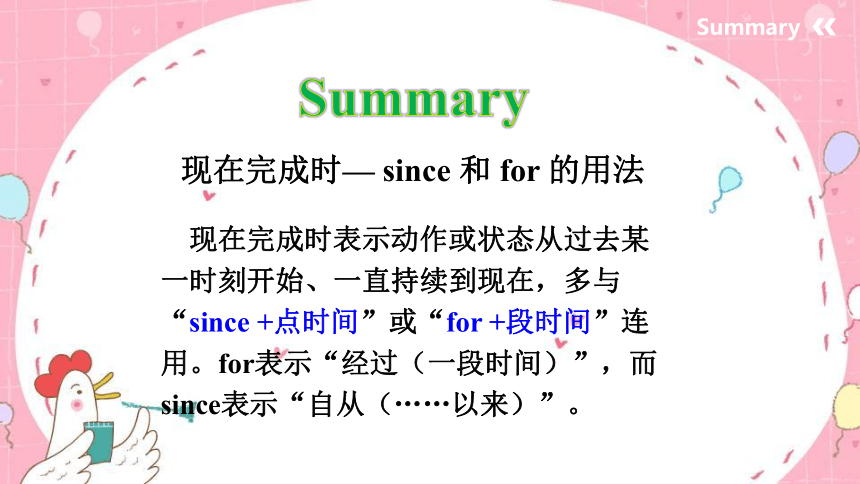

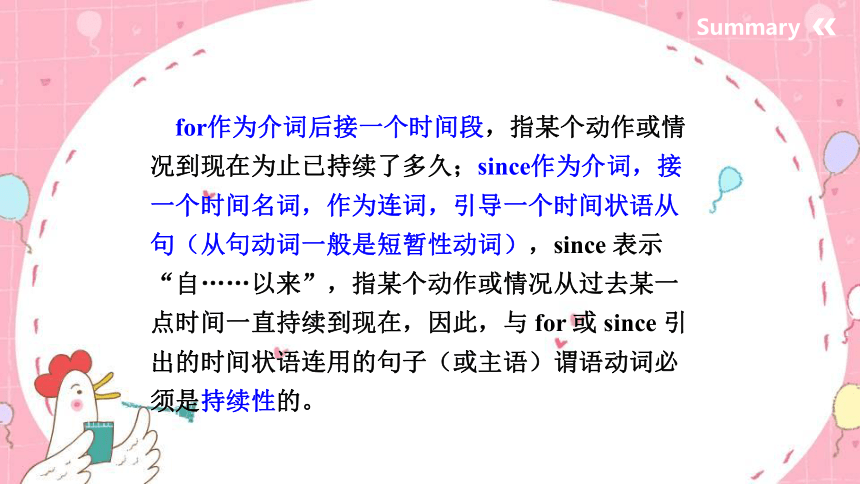
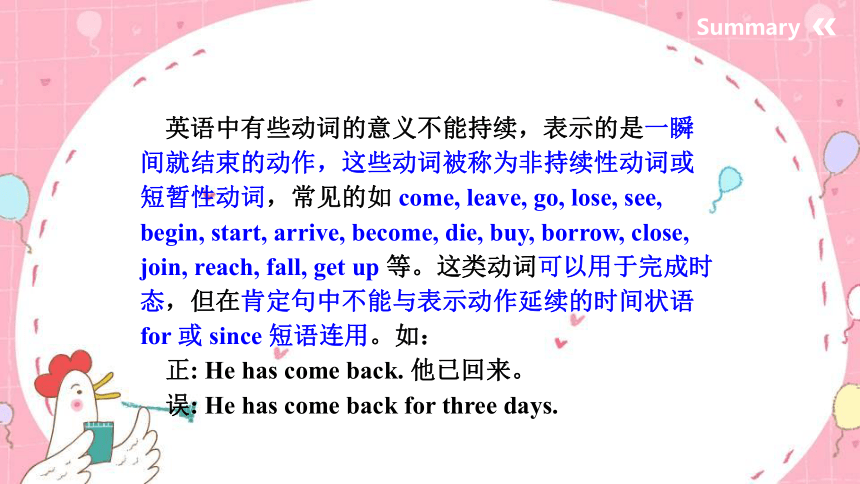
文档简介
(共45张PPT)
Module 4 Seeing the doctor
Unit 3 Language in use
Work in pairs
Make a dialogue with your classmates like this:
A: Hi, … What’s wrong with you
B: I have a …
A: I’m sorry to hear that. You should …
B: I think I will.
A: I hope …
B: Thank you.
Work in pairs
Work in pairs
Sam got sick two days ago.
Sam has been sick for two days.
Work in pairs
Sherry got her driver’s license (执照) in 2009.
Sherry has had her driver’s license since 2009.
Work in pairs
Arnold started to play tennis in January.
Arnold has played tennis since January.
Work in pairs
Maggie moved to Hawaii in 1996.
Maggie has lived in Hawaii for about 18 years.
Read the following sentences
Read the following sentences.
I haven’t done much exercise since I got my computer last year.
I have had him for three months now.
Since then, it has become part of my life.
Summary
现在完成时表示动作或状态从过去某一时刻开始、一直持续到现在,多与“since +点时间”或“for +段时间”连用。for表示“经过(一段时间)”,而since表示“自从(……以来)”。
现在完成时— since 和 for 的用法
Summary
Summary
for +表示一段时间的状语
一段时间+ ago
since + 表示过去的某一时间点
从句
He has lived here for 16 years.
他住在这里有十六年了。
He has lived here since 16 years ago.
他从十六年前起就住在这里了。
常见结构如下:
Summary
for作为介词后接一个时间段,指某个动作或情况到现在为止已持续了多久;since作为介词,接一个时间名词,作为连词,引导一个时间状语从句(从句动词一般是短暂性动词),since 表示“自……以来”,指某个动作或情况从过去某一点时间一直持续到现在,因此,与 for 或 since 引出的时间状语连用的句子(或主语)谓语动词必须是持续性的。
Summary
英语中有些动词的意义不能持续,表示的是一瞬间就结束的动作,这些动词被称为非持续性动词或短暂性动词,常见的如 come, leave, go, lose, see, begin, start, arrive, become, die, buy, borrow, close, join, reach, fall, get up 等。这类动词可以用于完成时态,但在肯定句中不能与表示动作延续的时间状语 for 或 since 短语连用。如:
正: He has come back. 他已回来。
误: He has come back for three days.
Summary
若要表示“他回来已三天了”这样的意思,可以将动词改为延续性动词,或改变时间状语,或改用别的句型等,如译为:
He has been back for three days. (改变谓语动词)
He has been back since three days ago. (改变谓语动词)
He came back three days ago. (改变时间状语及动词时态)
It’s three days since he came back. (改变句型)
Summary
在表示持续一段时间的句子中,应将短暂性动词转化为相同意义的延续性动词或状态动词。
初中英语中常见的有:
短暂性动词
延续性动词
go, leave, move
arrive, come, reach
join, become,
buy / get (得到)
be away (off), be out of
be here, be in +某地
be in, be a (an) + n.
have
Summary
短暂性动词
延续性动词
fall ill (asleep)
finish, end
begin, start
begin to learn (work, read, rain)
go out
get up
borrow
get to know
die
lose
be ill (asleep)
be over
be on
learn, (work, read, rain)
be out
be up
keep
know
be dead
be lost
Summary
非持续性动词用于完成时态,在肯定句中不能与for 或 since引出的短语(或句子)连用,但在否定句中是可以的,因为一个非延续性动词一旦被否定即成为状态,而状态总是可以延续的。如:
I haven’t seen him for a long time.
我很久没见到他了。
He hasn’t come here for some time.
他有段时间没来了。
I haven’t heard from her since she left.
自她离开以后,我一直没收到她的来信。
Practice
用括号内词的正确形式填空。
1. The old man ________(live) here since 1992.
2. _____ you _______(visit) our factory yet
3. I __________ (not see) you for a long time.
You _____________(change) a lot.
4. I’m afraid I __________(keep) you waiting
for a long time.
5. He __________(know) the city since he was very young.
has lived
Have
visited
haven’t seen
have changed
have kept
has known
Practice
Practice
选用 for和 since填空:
1. We haven’t seen each other ______ a long time.
2. His father has been in the Party ______ 10 years ago.
3. The film has been on _____ 20 minutes.
for
since
for
4. Mr Green has worked here ______ he came to China.
5. His grandparents have been dead ______ several years.
6. It’s five years _______ we met last time.
since
for
since
Practice
用for或since完成下列句子。
1. Jill is in Ireland now. She arrived there three days ago.
She has been there for three days.
2. Jack is here. He arrived here on Tuesday.
He has ______________________________.
3. I know Sue. I first met Sue two years ago.
I’ve _________________________________
____________.
been here since Tuesday.
known Sue since two years ago / for two years.
Practice
— Do you know Diaoyu Island
— Sure. It ______ China since ancient times.
A. belongs to B. belonged to
C. has belonged to D. is belonging to
C
Practice
— A new shop _______ for a week nearby. Let’s have a look there.
— Good idea. But it doesn’t ______ on Mondays.
A. opened; opened
B. has been opened; open
C. has opened; opened
D. has been open; open
D
Practice
I ______ my hometown for a long time. I really miss it.
A. left B. went away from
C. have left D. have been away from
D
He _____ in this factory for 20 years already.
A. will work B. works
C. has worked D. is working
C
Practice
My sister has learnt English _____.
A. for twelve years ago
B. since she was four
C. twelve years ago
D. at the age of four
B
She ______ the book _______ two days ago.
A. has borrowed; since
B. has kept; since
C. kept; for
B
Practice
— Look at these stamps. I _____ them for five years.
— Wow, they are wonderful.
A. kept B. have kept
C. have bought
B
He _____ for ten years.
A. has been married B. married
C. got married D. has married
A
Practice
(上海) The film Operation Red Sea _____ a lot of praise since its first show months ago.
A. wins B. win
C. will win D. has won
D
中考链接
Practice
(福建) China _________ great achievements in science and technology since 1978.
A. makes
B. made
C. has made
C
Practice
(天津) I _________ in the city since I left school.
A. live B. will live
C. was living D. have lived
D
Practice
(山东青岛) William Shakespeare ______ for 400 years, but his works still have great influence today.
A. died B. was dying
C. has died D. has been dead
(四川自贡) I _____ my hometown for a long time. I really miss it.
A. went away from
B. have been away from
C. have left
D
B
Practice
(天津) — What a nice watch! How long _____ you ____it
— For just two weeks.
A. will; buy B. have; had
C. were; having D. did; buy
(上海) This medicine _____millions of people’s lives since it was put into use.
A. is saving B. will save
C. has saved D. had saved
B
C
Practice
(北京) It’s nice to see you again. We ____ each other since 2014.
A. won’t see B. don’t see
C. haven’t seen D. didn’t see
(黑龙江齐齐哈尔) He _______the city since he graduated from college.
A. has left B. left
C. has been away from
C
C
Practice
(贵州安顺) Premier Zhou Enlai _____ for many years, he still lives in the hearts of Chinese people.
A. died B. was died
C. has been died D. has been dead
(杭州) I _____ scared of dogs ever since a dog hurt me when I was five years old.
A. will be B. was
C. have been D. would be
D
C
Practice
而对现在完成时的时间状语进行提问时,通常用how long
— How long have you had your bike
— I’ve had it for about two years.
— How long has Mary been a teacher
— Since two years ago.
Practice
How long have you studied at this school
Practice
How long have you studied English
Practice
How long have you known your best friend
Practice
How long have you lived in this place
Practice
How long have you used this book
Practice
3. Complete the sentences.
1 — I fell ill two days ago.
— So you’ve _________ ill for two days
— That’s right.
2 — I saw the doctor three days ago.
— So you haven’t _______ her in the last three days
been / felt
seen
Practice
3 — I’ll walk to school for the first time tomorrow.
— So you’ve never ______ to school before
4 — I came into hospital two days ago.
— So you’ve already ______ in hospital for two days
5 — How long ______ you _____ a headache
— Oh, it began about two hours ago.
walked
been
have
had
Practice
4 Complete the passage with the words and expressions in the box.
cold coughs exercise fast food
stomach ache weak well
For a long time John did not feel ____. He often had ______ and colds. He went to see a doctor. The doctor told him to take more _______ and stop eating ________. So he started riding a bike to school. At first, he felt tired and ______. Then he got fitter and started enjoying it. Since he started riding a bike, he has not had a(n) ______ and he has not had a(n) ____________ since he stopped eating fast food.
well
coughs
exercise
fast food
weak
cold
stomach ache
Work pairs
Can I help you
How long have you been like this
That’s it.
What’s wrong with me
Work pairs
Make conversations by using the sentences in the following box.
Practice
5. Complete the conversation with the sentences in the box.
Can I help you
How long have you been like this
That’s it.
What’s wrong with me
Doctor: _____________________
Bill: Well, I’ve got a pain in my back.
Doctor: _____________________
Bill: For about two weeks.
Doctor: Let me have a look. Where do you work
Can I help you
How long have you been like this
Practice
Bill: I work in an office.
Doctor: Do you play computer games
Bill: Yes, a lot. I usually play computers late at night.
Doctor: __________________
Bill: _____________________
Doctor: Well, you spend too much time in front of the computer.
Bill: What can I do
Doctor: Stand up and do some exercise from time to time. Don’t play computer games too much.
That’s it.
What’s wrong with me
Work pairs
Work pairs
Now work in pairs. Read out the conversation.
谢 谢!
Module 4 Seeing the doctor
Unit 3 Language in use
Work in pairs
Make a dialogue with your classmates like this:
A: Hi, … What’s wrong with you
B: I have a …
A: I’m sorry to hear that. You should …
B: I think I will.
A: I hope …
B: Thank you.
Work in pairs
Work in pairs
Sam got sick two days ago.
Sam has been sick for two days.
Work in pairs
Sherry got her driver’s license (执照) in 2009.
Sherry has had her driver’s license since 2009.
Work in pairs
Arnold started to play tennis in January.
Arnold has played tennis since January.
Work in pairs
Maggie moved to Hawaii in 1996.
Maggie has lived in Hawaii for about 18 years.
Read the following sentences
Read the following sentences.
I haven’t done much exercise since I got my computer last year.
I have had him for three months now.
Since then, it has become part of my life.
Summary
现在完成时表示动作或状态从过去某一时刻开始、一直持续到现在,多与“since +点时间”或“for +段时间”连用。for表示“经过(一段时间)”,而since表示“自从(……以来)”。
现在完成时— since 和 for 的用法
Summary
Summary
for +表示一段时间的状语
一段时间+ ago
since + 表示过去的某一时间点
从句
He has lived here for 16 years.
他住在这里有十六年了。
He has lived here since 16 years ago.
他从十六年前起就住在这里了。
常见结构如下:
Summary
for作为介词后接一个时间段,指某个动作或情况到现在为止已持续了多久;since作为介词,接一个时间名词,作为连词,引导一个时间状语从句(从句动词一般是短暂性动词),since 表示“自……以来”,指某个动作或情况从过去某一点时间一直持续到现在,因此,与 for 或 since 引出的时间状语连用的句子(或主语)谓语动词必须是持续性的。
Summary
英语中有些动词的意义不能持续,表示的是一瞬间就结束的动作,这些动词被称为非持续性动词或短暂性动词,常见的如 come, leave, go, lose, see, begin, start, arrive, become, die, buy, borrow, close, join, reach, fall, get up 等。这类动词可以用于完成时态,但在肯定句中不能与表示动作延续的时间状语 for 或 since 短语连用。如:
正: He has come back. 他已回来。
误: He has come back for three days.
Summary
若要表示“他回来已三天了”这样的意思,可以将动词改为延续性动词,或改变时间状语,或改用别的句型等,如译为:
He has been back for three days. (改变谓语动词)
He has been back since three days ago. (改变谓语动词)
He came back three days ago. (改变时间状语及动词时态)
It’s three days since he came back. (改变句型)
Summary
在表示持续一段时间的句子中,应将短暂性动词转化为相同意义的延续性动词或状态动词。
初中英语中常见的有:
短暂性动词
延续性动词
go, leave, move
arrive, come, reach
join, become,
buy / get (得到)
be away (off), be out of
be here, be in +某地
be in, be a (an) + n.
have
Summary
短暂性动词
延续性动词
fall ill (asleep)
finish, end
begin, start
begin to learn (work, read, rain)
go out
get up
borrow
get to know
die
lose
be ill (asleep)
be over
be on
learn, (work, read, rain)
be out
be up
keep
know
be dead
be lost
Summary
非持续性动词用于完成时态,在肯定句中不能与for 或 since引出的短语(或句子)连用,但在否定句中是可以的,因为一个非延续性动词一旦被否定即成为状态,而状态总是可以延续的。如:
I haven’t seen him for a long time.
我很久没见到他了。
He hasn’t come here for some time.
他有段时间没来了。
I haven’t heard from her since she left.
自她离开以后,我一直没收到她的来信。
Practice
用括号内词的正确形式填空。
1. The old man ________(live) here since 1992.
2. _____ you _______(visit) our factory yet
3. I __________ (not see) you for a long time.
You _____________(change) a lot.
4. I’m afraid I __________(keep) you waiting
for a long time.
5. He __________(know) the city since he was very young.
has lived
Have
visited
haven’t seen
have changed
have kept
has known
Practice
Practice
选用 for和 since填空:
1. We haven’t seen each other ______ a long time.
2. His father has been in the Party ______ 10 years ago.
3. The film has been on _____ 20 minutes.
for
since
for
4. Mr Green has worked here ______ he came to China.
5. His grandparents have been dead ______ several years.
6. It’s five years _______ we met last time.
since
for
since
Practice
用for或since完成下列句子。
1. Jill is in Ireland now. She arrived there three days ago.
She has been there for three days.
2. Jack is here. He arrived here on Tuesday.
He has ______________________________.
3. I know Sue. I first met Sue two years ago.
I’ve _________________________________
____________.
been here since Tuesday.
known Sue since two years ago / for two years.
Practice
— Do you know Diaoyu Island
— Sure. It ______ China since ancient times.
A. belongs to B. belonged to
C. has belonged to D. is belonging to
C
Practice
— A new shop _______ for a week nearby. Let’s have a look there.
— Good idea. But it doesn’t ______ on Mondays.
A. opened; opened
B. has been opened; open
C. has opened; opened
D. has been open; open
D
Practice
I ______ my hometown for a long time. I really miss it.
A. left B. went away from
C. have left D. have been away from
D
He _____ in this factory for 20 years already.
A. will work B. works
C. has worked D. is working
C
Practice
My sister has learnt English _____.
A. for twelve years ago
B. since she was four
C. twelve years ago
D. at the age of four
B
She ______ the book _______ two days ago.
A. has borrowed; since
B. has kept; since
C. kept; for
B
Practice
— Look at these stamps. I _____ them for five years.
— Wow, they are wonderful.
A. kept B. have kept
C. have bought
B
He _____ for ten years.
A. has been married B. married
C. got married D. has married
A
Practice
(上海) The film Operation Red Sea _____ a lot of praise since its first show months ago.
A. wins B. win
C. will win D. has won
D
中考链接
Practice
(福建) China _________ great achievements in science and technology since 1978.
A. makes
B. made
C. has made
C
Practice
(天津) I _________ in the city since I left school.
A. live B. will live
C. was living D. have lived
D
Practice
(山东青岛) William Shakespeare ______ for 400 years, but his works still have great influence today.
A. died B. was dying
C. has died D. has been dead
(四川自贡) I _____ my hometown for a long time. I really miss it.
A. went away from
B. have been away from
C. have left
D
B
Practice
(天津) — What a nice watch! How long _____ you ____it
— For just two weeks.
A. will; buy B. have; had
C. were; having D. did; buy
(上海) This medicine _____millions of people’s lives since it was put into use.
A. is saving B. will save
C. has saved D. had saved
B
C
Practice
(北京) It’s nice to see you again. We ____ each other since 2014.
A. won’t see B. don’t see
C. haven’t seen D. didn’t see
(黑龙江齐齐哈尔) He _______the city since he graduated from college.
A. has left B. left
C. has been away from
C
C
Practice
(贵州安顺) Premier Zhou Enlai _____ for many years, he still lives in the hearts of Chinese people.
A. died B. was died
C. has been died D. has been dead
(杭州) I _____ scared of dogs ever since a dog hurt me when I was five years old.
A. will be B. was
C. have been D. would be
D
C
Practice
而对现在完成时的时间状语进行提问时,通常用how long
— How long have you had your bike
— I’ve had it for about two years.
— How long has Mary been a teacher
— Since two years ago.
Practice
How long have you studied at this school
Practice
How long have you studied English
Practice
How long have you known your best friend
Practice
How long have you lived in this place
Practice
How long have you used this book
Practice
3. Complete the sentences.
1 — I fell ill two days ago.
— So you’ve _________ ill for two days
— That’s right.
2 — I saw the doctor three days ago.
— So you haven’t _______ her in the last three days
been / felt
seen
Practice
3 — I’ll walk to school for the first time tomorrow.
— So you’ve never ______ to school before
4 — I came into hospital two days ago.
— So you’ve already ______ in hospital for two days
5 — How long ______ you _____ a headache
— Oh, it began about two hours ago.
walked
been
have
had
Practice
4 Complete the passage with the words and expressions in the box.
cold coughs exercise fast food
stomach ache weak well
For a long time John did not feel ____. He often had ______ and colds. He went to see a doctor. The doctor told him to take more _______ and stop eating ________. So he started riding a bike to school. At first, he felt tired and ______. Then he got fitter and started enjoying it. Since he started riding a bike, he has not had a(n) ______ and he has not had a(n) ____________ since he stopped eating fast food.
well
coughs
exercise
fast food
weak
cold
stomach ache
Work pairs
Can I help you
How long have you been like this
That’s it.
What’s wrong with me
Work pairs
Make conversations by using the sentences in the following box.
Practice
5. Complete the conversation with the sentences in the box.
Can I help you
How long have you been like this
That’s it.
What’s wrong with me
Doctor: _____________________
Bill: Well, I’ve got a pain in my back.
Doctor: _____________________
Bill: For about two weeks.
Doctor: Let me have a look. Where do you work
Can I help you
How long have you been like this
Practice
Bill: I work in an office.
Doctor: Do you play computer games
Bill: Yes, a lot. I usually play computers late at night.
Doctor: __________________
Bill: _____________________
Doctor: Well, you spend too much time in front of the computer.
Bill: What can I do
Doctor: Stand up and do some exercise from time to time. Don’t play computer games too much.
That’s it.
What’s wrong with me
Work pairs
Work pairs
Now work in pairs. Read out the conversation.
谢 谢!
同课章节目录
- Module 1 Feelings and impressions
- Unit 1 It smells delicious.
- Unit 2 I feel nervous when I speak Chinese .
- Unit 3 Language in use
- Module 2 Experiences
- Unit 1 I've also entered lots of speaking competi
- Unit 2 They have seen the Pyramids.
- Unit 3 Language in use
- Module 3 Journey to space
- Unit 1 Has it arrived yet?
- Unit 2 We have not found life on any other planet
- Unit 3 Language in use
- Module 4 Seeing the docto
- Unit 1 I haven't done much exercise since I got m
- Unit 2 We have played football for a year now
- Unit 3 Language in use
- Module 5 Cartoons
- Unit 1 It's time to watch a cartoon.
- Unit 2 Tintin has been popular for over eighty yea
- Unit 3 Language in use
- Revision module A
- Module 6 Hobbies
- Unit 1 Do you collect anything ?
- Unit 2 Hobbies can make you grow as a person.
- Unit 3 Language in use
- Module 7 Summer in Los Angeles
- Unit 1 Please write to me and send me some photos
- Unit 2 Fill out a form and come to learn English
- Unit 3 Language in use
- Module 8 Time off
- Unit 1 I can hardly believe we are in the city ce
- Unit 2 We thought somebody was moving about
- Unit 3 Language in use
- Module 9 Friendship
- Unit 1 Could I ask if you've mentioned this to he
- Unit 2 I believe that the world is what you think
- Unit 3 Language in use
- Module 10 On the radio
- Unit 1 I hope that you can join us one day
- Unit 2 It seemed that they were speaking to me in
- Unit 3 Language in use
- Revision module B
